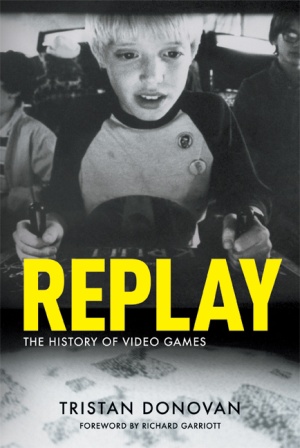
Video Game Book Reviews
We already covered The Ultimate History of Video Games, by Steven Kent, acknowledging both its excellence and its shortcomings. It's a fantastic book and absolutely worth owning, despite some glaring omissions. Tristan Donovan's Replay: The History of Video Games aims to fill the same niche, even starting its introduction with a quote from Michael Katz who asks: why another book on gaming history? Although Donovan never mentions Kent's work outright, he makes it explicitly clear that Replay is intended to provide more balanced global coverage; not just the history of US video games, but of Europe and Japan as well, covering computers, arcades, consoles, plus factoring in snippets on real world conflicts, comic books, films, censorship, and all else related. It's an all-encompassing holistic view of video game history.
Donovan actually manages to pull off such an ambitious goal, over Replay's roughly 500 pages. As a Brit he pays respectable attention to uniquely British games, such as Deux Ex Machina on the Spectrum, and there are two chapters dedicated entirely to European gaming (with a bit of Australia too). While it starts off strongly US-centric, which is understandable, it does branch out into chapters dedicated to Japan, South Korea, snippets of East Asia, plus online and indie games. While these individually don't offer the range of information that a dedicated website can (such as HG101's Korean History feature), to criticise Replay for this would be wrong. It still casts the widest net of any currently available book.
It uses a combination of fresh interview material, plus quotes from a range other sources, including old newspaper clippings and modern magazine interviews. This is significant, since while most games magazines have disdain for re-using old quotes, Donovan shows how important it can be to build on the work of others, doing it to great success. Furthermore he provides a meticulous list of sources (8% of total page volume) and footnotes, which is something every video game publication should contain though sadly almost never does.
For those wanting direct comparisons to Kent's book, Replay lacks its rival's ostentatious US swagger - there's no enlarged industry quotes which leap off the page and the layout is more understated. There's also a few grammatical errors and sometimes the prose is slightly stilted, but this shouldn't put you off. A single body of work of such length and scope on games is rare, with the effort and research required by Donovan evident on every single page. It's also a fantastic and fascinating read, filled with fresh trivia and anecdotes, and is wholly conscious of the wider context of the gaming world. Donovan also managed to secure some nice archive photographs, prefacing each chapter. Replay doesn't entirely make Kent's work redundant, but it takes the scope to a new level. If you're into gaming enough to own one book on its history, you'll probably want both of them.
